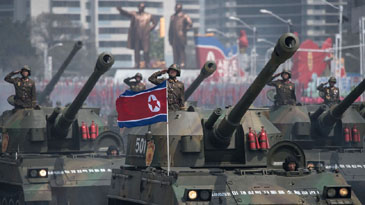| « US Intends New Illegal Sanctions on China | Ripoff Trumpcare and Tax Cut Schemes » |
Reckless US Policy Toward North Korea
Stephen Lendman (stephenlendman.org (Home - Stephen Lendman)
Decades of US hostility toward the DPRK created heightened tensions, threatening possible conflict on the Korean peninsula - an unthinkable prospect pitting two nuclear powers against each other if launched.
Pyongyang, China, Russia, and South Korea want issues resolved diplomatically. Washington needs enemies to justify its unjustifiable imperial agenda, North Korea a longstanding one - because of its sovereign independence, not for any threat it poses. It never attacked another country throughout its entire post-WW II history. It threatens none now, except in retaliation if attacked, its right under international law.
China is displeased with Trump administration pressure to ally with its unacceptable strategy - economic and financial strangulation to bring the DPRK to its knees, a lunatic scheme Beijing rejects, an unworkable one if implemented.
The only way to resolve Korean peninsula issues is the diplomatic road Washington won’t take. That’s the key issue, no other.
On July 12, China’s People’s Daily headlined “No more trumpeting ‘China responsibility’ on Pyongyang,” saying:
US “ramping up pressure on China to do more on curbing Pyongyang’s nuclear and missile weaponry” is an unacceptable strategy.
“(A)ccusing China of not living up to its responsibility in efforts to denuclearize the Korean Peninsula is totally groundless.”
“The United States, while pointing fingers at others, should realize it cannot escape its own duty for stabilizing the situation.”
“For whatever reason…the United States and Japan have reignited the ‘China responsibility theory’ for their failure on the Korean Peninsula nuclear issue, but refused to fulfill their duties to negotiate a peaceful resolution.”
During a Tuesday press briefing, China’s Foreign Ministry spokesman Geng Shuang expressed the same sentiment, suggesting likely “ulterior motives” lie behind US intransigence.
“Asking others to do work, but doing nothing themselves is not OK,” he stressed. “Being stabbed in the back is…not OK.”
“The ‘China responsibility theory’ on the peninsula nuclear issue can stop.”
Pyongyang justifiably says its nuclear and ballistic missile programs are non-negotiable, “unless the US hostile policy and nuclear threat to the DPRK are definitely terminated,” according to its Korean Central News Agency (KCNA).
During a joint Vladimir Putin/Xi Jinping news conference in Moscow last week, Russia’s president said the following:
“We’ve agreed to promote our joint initiative, based on Russian step-by-step Korean settlement plan and Chinese ideas to simultaneously freeze North Korean nuclear and missile activities, and US and South Korean joint military drills.”
A joint statement by Russian and Chinese foreign ministers said “(t)he two sides stress that justified North Korean concerns should be respected,” adding:
Military force on the Korean peninsula “must be ruled out.” Provocative US THAAD missile systems must be removed.
They “gravely (threaten the) strategic safety interests of regional powers, including Russia and China, and do not contribute to the de-nuclearization of the Korean Peninsula, as well as towards establishing peace and stability in the region.”
Russia and China reject a draft US Security Council resolution likely to be voted on in the coming days - imposing unacceptably harsh sanctions on Pyongyang, including making its economy scream, creating greater Korean peninsula instability than already if approved.
Days earlier, US B-1 strategic bombers and South Korean warplanes conducted a live-fire exercise near the DMZ, simulating an attack on DPRK missile sites and underground facilities.
Pyongyang believes this type provocation, along with US regional military exercises, jointly with South Korea and Japan, are preparations for war on its country.
Its nuclear and ballistic missile programs are vital deterrents. Without them, it’s defenseless.
It’s likely willing to suspend both programs if its national security is no longer threatened. It seeks good faith US diplomatic outreach as a way to resolve bilateral differences.
Washington remains stubbornly hardline - wanting its will imposed on Pyongyang and all other countries, war its favored strategy.
-###-
Stephen Lendman lives in Chicago. He can be reached at lendmanstephen@sbcglobal.net.
VISIT MY NEW WEB SITE: stephenlendman.org (Home - Stephen Lendman)
My newest book as editor and contributor is titled "Flashpoint in Ukraine: How the US Drive for Hegemony Risks WW III."
Virus-free. www.avg.com



